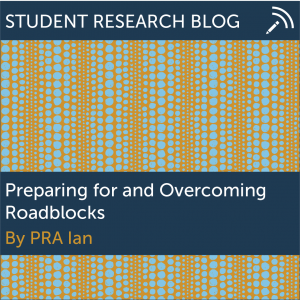 By Ian Sands, OUR Peer Research Ambassador
By Ian Sands, OUR Peer Research Ambassador
The beginning stages of research primarily consist of planning. That planning may pertain to a variety of things such as budget, timeline, procedure, and even how you plan to communicate the findings of your study. What may be most important to consider, however, is the inevitable reality that no research plan goes perfectly as planned a majority of the time. These research complications may come in many forms, ranging from the classic inconvenient delay of supply delivery all the way to a less common sudden campus closure due to a global pandemic. Whatever the roadblock is, every researcher must maintain patience, adaptability, and resilience to overcome the complications they are experiencing.
Here, I will talk a little about the types of roadblocks you may experience as a researcher and the methods I have developed to continue progress during these times.
Expect the Unexpected
When designing an experiment or protocol for a procedure you are about to conduct, you should always expect that some way, somehow, something may go wrong along the way. In my case, this has taken the form of reagent delivery delays, contaminated cells, contaminated media, and cell morphology inconsistencies. In other fields of research, this may present as a subject interview postponed due to illness, a software complication during computational analytics, a delayed delivery of resources, or many other small inconveniences that push back the timeline and thus the results of your research. This is where patience is an invaluable mindset to maintain before, during, and after the timeline of your project. Before starting, you should never design a project timeline with no room allowed for error. This will cause immense stress during the course of your research and can seriously impact the credibility of your data if you feel the need to rush just to stay on track with your pre-established timeline. Patience is needed to understand that complications are likely to emerge and you will thank yourself later down the line when you provide enough room to adjust your project if and when things go awry.
Overcoming Roadblocks
With respects to longer-than-expected delays in the research process, patience is still required; however, adaptability and resilience are far more valuable. Larger scale complications can come in many forms that may force you to adjust your project plan partially or entirely. You may have guessed it but out of those many forms, many others and I are currently struggling with having to adapt to a global pandemic that has caused restrictions to travel, resources, and most importantly access to laboratories. If you are lucky enough to be in a lab that makes it easy to work from a remote location, this situation doesn’t necessarily pertain to you. For the rest of us who rely on interaction with equipment and lab personnel, this is putting a large roadblock in our way, hence the reason I feel the need to discuss the importance of adaptability and resilience.
Depending on how far you are into your own project, you may be at a comfortable enough point to transition to data management and analytics at home. Since there is no access to lab equipment, working on charts, graphs, and other visual representations of your data is a good way to prepare an organized representation of your research thus far. This may also help with future publications, as you will have already prepared parts of your data for viewing. This process may also generate new ideas or insights about your research that can inform how you proceed.
If you are in the earlier stages of your research, continued preparation such as intensive literature review and method researching may be done so that you can become more knowledgeable in the field you intend on studying. As a researcher, literature review should be a common practice on a week-to-week, or even day-to-day basis so this may be a great time to get into the habit of exploring and reviewing literature published in your fields of interest. This may also inspire you to adjust and adapt your project in a different direction once research resumes in (hopefully) the near future.
Ian is a senior majoring in Biomedical Engineering. Click here to learn more about Ian.